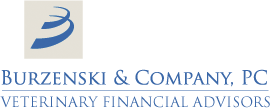An article from CPA Practice Advisor on Stock vs. Asset Sale as a parameter to business valuation engagements. http://www.cpapracticeadvisor.com/news/12188993/add-stock-vs-asset-sale-... To learn more about Burzenski & Company Veterinary Financial Advisors practice valuation & transition services click here: http://veterinaryfinancialadvisors.com/content/practice-valuation-transi...

Learn more about how some veterinarians are changing their office space and professional image to reduce pet and owner stress about coming to the office. Let us know what you think about this growing trend and if you’re planning on getting certified as a fear-free clinic.
http://bigstory.ap.org/article/3f8130450d6440c797db54cbca51dcdb/fear-fre...
Like us on Facebook to stay up to date on growing and building your veterinary practice.
http://quickbooks.intuit.com/r/technology-and-security/what-is-emv-and-why-do-i-need-it
This is a video launched by Henry Schein Animal Health as part of their 2014 Veterinary Pharmacy Diets and Data Solutions Workshop. It features Burzenski & Company's Gary I. Glassman, CPA along with other respected and well-known financial experts in veterinary business today. The topic: 2014 Nutrition Volume and Profitability.
Says Gary, "Make sure you watch the video. It really talks to the state of the veterinary industry. It was great working with Fritz Wood, Marsha Heinke and Karen Felsted."
https://www.youtube.com/watch?v=XSBnaDG3NmA&feature=youtu.be
This is the first in a series of articles launched by Henry Schein Animal Health that assimilate and convey the insightful viewpoints of Gary I. Glassman, CPA and other respected and well-known financial experts in the veterinary business today.Click here to read the article: https://lnkd.in/e9VTW9hless
An accompanying video was also launched by Henry Schein Animal Health. The topic: Introduction and Value of Pharmacy to the Veterinary Practice. Click here to view the video: http://player.vimeo.com/external/119886220.hd.mp4?s=8039bd12dc46bfdf500b218bdfe928cc
Says Gary, "Make sure you watch the video. It really talks to the state of the veterinary industry. Thank you to Henry Schein and their sponsors for putting this program together. It was great to work with such well respected experts as Fritz, Karen and Marsha on this project.
We thought you'd find this article by Gary Glassman, CPA to be informative: http://blogs.idexx.com/7-tips-for-tax-season/
You might find this information about client retention useful.
Source: American Animal Hospital Association
You may find this article interesting. http://www.huffingtonpost.com/2015/01/08/leap-second_n_6437686.html?ir=Technology&utm_campaign=010815&utm_medium=email&utm_source=Alert-technology&utm_content=Title
Source: The Huffington Post | By Damon Beres
Point number one: veterinary practices should have firewalls and technology policies in place to protect their computer software. Unfortunately, many practices do not have firewalls or policies though. A professionally installed hardware firewall is a vital security device that can hinder hackers from accessing your internal network. It can also keep confidential data from leaking out.
An Internet connection, especially a broadband connection, is the most common entry point for most hackers. These would be thieves and business thugs constantly find new ways to access computer systems. Hopefully your practice’s computer system will not be one that they target.
It is imperative that you do whatever you can to keep your practice’s internal computer system and even financial records from being compromised.
Here are suggested steps your practice can fairly easily implement to keep potential hacker disruption to a minimum and protect your practice. These basic security suggestions are simple enough for most hospitals to achieve.
- Only owners and practice managers should have the administrator passwords and handle the most basic software installs themselves. An outside IT or Practice Management System (PMS) vendor should be called to handle more advance software installations and may access the system with owner/manager permission only.
- Internal Wi-Fi networks must have strong passwords that are only known by practice owners and managers.
- Public Wi-Fi for client use must also be password protected but the password should be posted in the reception area. This protects clients and prevents them from getting into each other's cyber business.
- Windows Operating System updates should be set to automatic on all computers. Call your PMS vendor before turning on any server software firewalls.
- If you have Adobe Flash/Reader and/or Java installed, they should be updated every month. The latest Chrome browser self-updates as does the latest Firefox browser,
- The log in for most Windows users should be as a Standard or Restricted user. All software must be installed under administrator rights for standard or restricted users.
- For hardware firewalls, Sonic Walls can be installed between the Internet modem and the main network switch, anti-virus and anti-malware software should be installed on each computer. Microsoft Security Essentials is a minimum requirement if PMS interference is a concern, but double check with your PMS vendor.
- Configured and installed Sonic Walls cost about $1,500 for the most basic models. They are now sold by Dell and resold by many IT providers. The Barracuda units are better and more costly because they are single purpose units, such as a firewall unit, anti-virus unit or an anti-spam unit.
Pages
Archives
- November, 2021
- September, 2021
- August, 2021
- April, 2021
- March, 2021
- January, 2021
- November, 2020
- October, 2020
- August, 2020
- July, 2020
- June, 2020
- May, 2020
- April, 2020
- March, 2020
- January, 2020
- December, 2019
- November, 2019
- October, 2019
- September, 2019
- August, 2019
- July, 2019
- June, 2019
- May, 2019
- April, 2019
- March, 2019
- February, 2019
- January, 2019
- December, 2018
- November, 2018
- October, 2018
- August, 2018
- July, 2018
- June, 2018
- May, 2018
- March, 2018
- February, 2018
- January, 2018
- December, 2017
- November, 2017
- October, 2017
- September, 2017
- August, 2017
- June, 2017
- March, 2017
- February, 2017
- December, 2016
- November, 2016
- October, 2016
- August, 2016
- July, 2016
- May, 2016
- April, 2016
- February, 2016
- December, 2015
- November, 2015
- July, 2015
- June, 2015
- April, 2015
- March, 2015
- February, 2015
- January, 2015
- September, 2014
- August, 2014
- July, 2014
- May, 2014
- June, 2014
Recent Blog Posts








